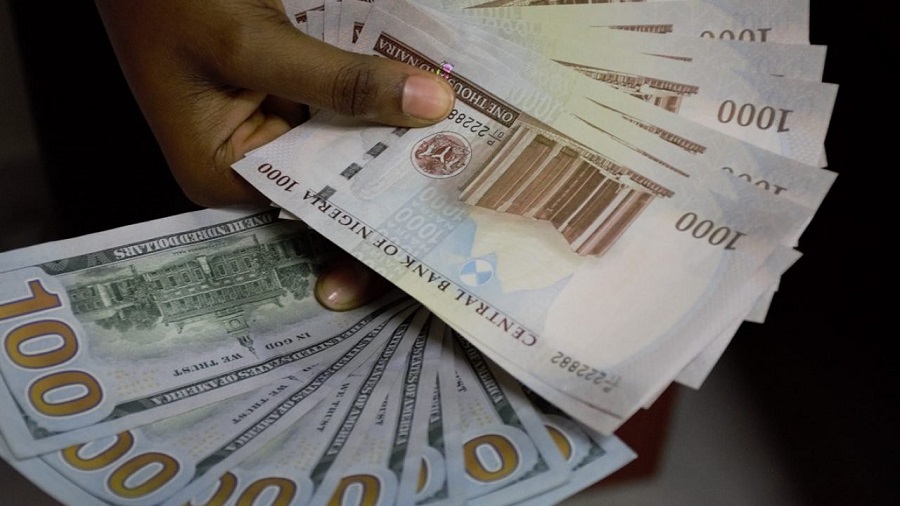By
Chike OlisahForex turnover dropped by 65.6%, as the Naira’s
exchange rate at the NAFEX window depreciated against the dollar to
close at N395/$1 during intra-day trading on Wednesday, December 2.
Also, the Naira appreciated against the dollar, closing at N485/$1 at
the parallel market on Wednesday, December 2, 2020, as the CBN’s new
policy on diaspora remittances seems to be having a significant impact
on the black market
In the amended procedures for receipt of diaspora remittances, the
recipients are allowed to collect dollars and can sell at the black
market in an apparent attempt to improve liquidity in the forex market
and reduce the disparity between the black market and the official
market.
ABCON President, Aminu Gwadebe, had blamed the crash
of the naira on illegal activities that include hoarding, speculation,
illegal cash evacuations through the nation’s borders, use of the dollar
for gratification and so on.
Parallel market: According to information from
Abokifx – a prominent FX tracking website, at the black market where
forex is traded unofficially, the Naira appreciated against the dollar
to close at N485/$1 on Wednesday.
This represents a N5 gain when compared to the N490/$1 that it exchanged for on Tuesday, December 1.
- The local currency had strengthened by about 7.8% within one week in
September at the black market, as the CBN introduced some measures
targeted at exporters and importers.
- This is to boost the supply of dollars in the foreign exchange market and reduce the high demand for forex by traders
- However, the gains appear to have been completely erased with the recent crash of the exchange rate.
- The CBN has sold over $1 billion to BDCs since they resumed forex sales on Monday, September 7, 2020.
- This was expected to inject more liquidity into the retail end of
the foreign exchange market and discourage hoarding and speculation.
- However, the exchange rate against the dollar has remained volatile
after the initial gains made, following the CBN’s resumption of sales of
dollars to the BDCs.
- Despite the CBN intervention, the huge demand backlog by
manufacturers and foreign investors still puts pressure and creates a
volatile situation in the foreign exchange market.
NAFEX: The Naira depreciated against the dollar at the Investors and Exporters (I&E) window on Tuesday, closing at N395/$1.
- This represents a N1 drop when compared to the N394 that it exchanged for on Tuesday, December 1.
- The opening indicative rate was N392.54 to a dollar on Wednesday.
This represents an 84 kobo drop when compared to the N391.70 that was
recorded on Tuesday.
- The NΖ to a dollar was the highest rate during intra-day trading
before, it still closed at N394.50 to a dollar. It also sold for as low
as N380/$1 during intra-day trading.
- Forex turnover: Forex turnover at the Investor and Exporters (I&E) window declined by 65.6% on Tuesday, December 1, 2020.
- According to the data tracked by Nairametrics from
FMDQ, forex turnover declined from $168.57 million on Tuesday, December
1, 2020, to $57.97 million on Tuesday, December 1, 2020.
- The CBN is still struggling to clear the backlog of foreign exchange
demand, especially by foreign investors wishing to repatriate their
funds.
- The sharp drop in dollar supply after the previous trading day’s
increase reinforces the volatility of the foreign exchange market. The
supply of dollars has been on a decline for months due to low oil prices
and the absence of foreign capital inflow into the country.
- The average daily forex sale for last week was about $169.93
million, which represents a huge increase from the $34.5 million that
was recorded the previous week.
- Total forex trading at the NAFEX window in the month of September
was about $1.98 billion, compared to $843.97 million in August.
- The exchange rate is still being affected by low oil prices, dollar
scarcity, a backlog of forex demand, and a shaky economy that has been
hit by the coronavirus pandemic.
- Some members of MPC of the CBN have expressed serious concerns over
the increasing demand pressure in the country’s foreign exchange market.
This is an obligation of manufacturers to their foreign suppliers that
continues to increase in the face of dollar shortages.





No comments :
Post a Comment